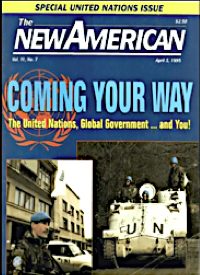
What is Agenda 21? The constitutionalist movement has heard vague echoes in recent years about a threat to the free economy from this Agenda 21. Agenda 21 is not new. The New American magazine (and its affiliate, the John Birch Society), was one of the few constitutionalist organizations that was present when it was drawn up, back at the 1992 Earth Summit on climate change in Rio de Janeiro. The summit, organized by the United Nations, brought together the most extreme environmental activists from around the world to deal with the supposed threat from global warming, and Agenda 21 was the document they drew up.
The New American’s William F. Jasper attended the conference as a reporter, and was able to report on events at the Rio Summit as they happened.
What came out of the Rio summit was summed up by the radical environmentalists themselves, and one United Nations-approved introduction to the Agenda 21 document claimed that:
Effective execution of Agenda 21 will require a profound reorientation of all human society, unlike anything the world has ever experienced — a major shift in the priorities of both governments and individuals and an unprecedented redeployment of human and financial resources. This shift will demand that a concern for the environmental consequences of every human action be integrated into individual and collective decision-making at every level.
The document left no one alone, stating that:
There are specific actions which are intended to be undertaken by … in short, every person on Earth.
What it means for Americans is more than just an end to fossil fuels; it means a lower standard of living.
And the strategy for implementing Agenda 21 was much broader than ever attempted before by the environmentalist movement. They sought global treaties and national legislation, as in the past. They also sought to shame individuals and corporations into changing their behavior on a voluntary basis. That, too, was not new. But they began fighting for “soft-law” changes to consumers’ living standards. “Soft law” is the use of centralized governments to bribe with aid either smaller government sub-units (states or localities) or private companies for following ever-more stringent eco-standards with tax breaks or outright cash “aid.”
On the state and local level, the push for “soft law” is led by the International Council for Local Environmental Initiatives, or ICLEI, which had been founded a couple of years before the Rio Summit. More than 1,000 state, county, and municipal government organizations around the world are ICLEI members, and are pushing this radical environmentalist agenda with bribes and stiffer regulations. In many American towns, local officials boast about the impact of ICLEI in the form of putting state rebate checks on display for properly following new environmentalist incentives. For example, John Birch Society New England Regional Director Hal Shurtleff was able to point out that:
Here is what’s disturbing. Here is a check, made out to the City of Newburyport from the Massachusetts Executive Office of Energy and Environmental Affairs. And why is this check on display? This is the second such check that I have found in a city or town that belongs to the ICLEI, the International Council on Local Environmental Initiatives, which is a government-to-government entity, unconstitutional on its face. And their goal is to implement Agenda 21, what they call “soft law” that came out of the Rio conference in 1992, very hostile to property rights, freedoms.
ICLEI has become a big part of the subsidy and regulation regime on the state and local level, but it’s not the only part of the eco-subsidy agenda. That also extends to the White House, where President Obama has called for government to start picking winners and losers in the markets for more energy-efficient products. President Obama boasted in his May 6, 2011 weekly address to the nation that he would continue to “invest” in green jobs.
This is part of the reason why huge corporations such as General Electric were able to claim a $3.25 billion tax credit in 2010, paying no corporate income taxes last year. GE cashed in on federal “tax credits” for green projects, such as its wind turbine projects.
Of course, nobody objects to private companies offering more fuel-efficient automobiles or creating products that don’t fill up landfills. The problem with ICLEI and Agenda 21 is that they primarily seek governments to pick winners and losers in the marketplace. Governments usually pick the wrong winners. That was the lesson from the housing bubble of the last decade. The federal government promoted home ownership by subsidies, tax credits, and suppression of interest rates, and crashed the economy. Government doing the same thing on green jobs will do the same thing to the economy on a much larger scale.



